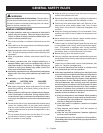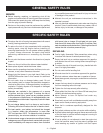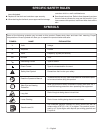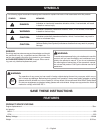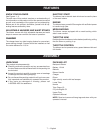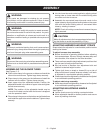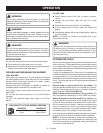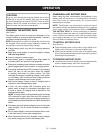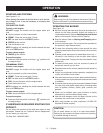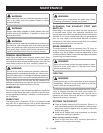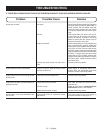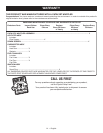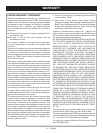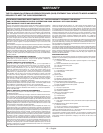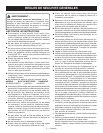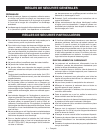
11 — English
OPERATION
STARTING AND STOPPING
See Figures 9 - 11.
When starting the product for the first time or when the bat-
tery voltage is low, it may be necessary to manually start
this product.
FOR ELECTRIC START:
To start a cold engine:
DO NOT engage the throttle until the engine starts and
runs.
Lay the product on a flat, bare surface.
PRIME - Press the primer bulb 7 times.
SET the start lever to the START position.
PRESS ignition switch.
Push the throttle to run.
NOTE: Engaging and releasing the throttle releases the start
lever to the RUN position.
To start a warm engine:
PRESS ignition switch.
To stop the engine:
Press and hold the switch in the stop “ ” position until
the engine stops.
FOR MANUAL START:
To start a cold engine:
DO NOT engage the throttle until the engine starts and
runs.
Lay the product on a flat, bare surface.
PRIME - Press the primer bulb 7 times.
SET the start lever to the START position.
PULL the recoil starter until the engine starts.
Push the throttle to run.
NOTE: Engaging and releasing the throttle releases the start
lever to the RUN position.
To start a warm engine:
PULL the recoil starter until the engine starts.
To stop the engine:
Press and hold the switch in the stop “ ” position until
the engine stops.
IF ASSISTANCE IS REQUIRED STARTING THIS
PRODUCT:
Do not return this product to the retail store where it was
purchased. Please call our Customer Service Department
for any issues you may have.
For Help Call: 1-800-860-4050.
WARNING:
Keep away from all hot surfaces of the blower. Failure to
do so could result in possible serious personal injury.
OPERATING THE BLOWER
See Figure 12.
Slip arm through harness strap and onto shoulder, then
repeat for the other shoulder. Adjust the straps to a
comfortable position. Refer to Adjusting Harness Straps
earlier in this manual. Remove unit for starting.
Start the blower. Refer to Starting and Stopping earlier
in this manual.
Put on the blower again. The unit should be operated on
the operator’s right side as shown.
To keep from scattering debris, blow around the outer
edges of a debris pile. Never blow directly into the center
of a pile.
Operate power equipment at reasonable hours only —
not early in the morning or late at night when people
might be disturbed. Comply with the times listed in local
ordinances.
To reduce sound levels, limit the number of pieces of
equipment used at any one time.
Operate blower at the lowest possible throttle speed to
do the job.
Check your equipment before operation, especially the
muffler, air intakes, and air filters.
Use rakes and brooms to loosen debris before blowing.
In dusty conditions, slightly dampen surfaces when water
is available.
Conserve water by using power blowers instead of hoses
for many lawn and garden applications, including areas
such as gutters, screens, patios, grills, porches, and
gardens.
Watch out for children, pets, open windows, or freshly
washed cars, and blow debris safely away.
Use the wide sweeper nozzle for larger volume, so the
air stream can work close to the ground.
After using blowers or other equipment, CLEAN UP!
Dispose of debris properly.
CAUTION:
Do not place blower on top of or near loose debris.
Debris may be sucked into blower intake vent resulting
in possible damage to the unit.



